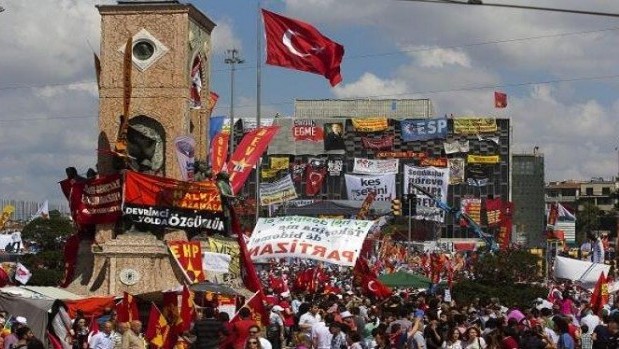
Anti-government protesters in Gezi Park, near Taksim Square in Istanbul, Turkey, on June 9 (APA/Kerin Okten)
Assembled in front of Doğuş Holding, the owner of NTV Channel, protesters chanted, “We don’t want corrupt media.”
As a result, journalists took to social media in order to cover the protests that had swept through the country for the previous 10 days.
Speaking exclusively to Asharq Al-Awsat, Murat Yetkin, the editor-in-chief of Hurriyet Daily News newspaper, said protesters in Turkey appeared to have despaired of the country’s media outlets. During the protests, one channel broadcast a “show on the beautiful baths located in the area around Taksim square, the place where the protests started,” while another channel showed a theoretical “Mars exploration mission.”
According to Yetkin, only Ülke TV and Kanal+1 channels broke the wall of silence in Turkey.
Speaking on a condition of anonymity, a senior Turkish journalist told Asharq Al-Awsat that many journalists in Turkey complained from the “self-censorship” imposed by the owners of newspapers, who are businessmen not journalists and who have links to the government.
Doğan Holding owns Kanal D, CNN Türk, Hurriyet Daily News, Radikal gazetesi, and seven other newspapers, and is considered one of the leading media conglomerates in Turkey, is not on best terms with the ruling Justice and Development Party. The group launched a campaign in 2008 against Erdoğan’s government, which responded by imposing heavy taxes.
Up until now, Erdoğan’s government has had a troubled relationship with the press. Reporters without Borders (RSF), which campaigns for freedom of press worldwide, claims that the number of journalist detained by the Turkish government exceeds those in China, Eritrea, Iran and Syria, turning Turkey into the “world’s biggest prison for journalists.”
According to RSF, such a high number of journalists—72 altogether—are detained in Turkey due to oppression, ambiguous laws and a suspect judicial system.
The following is a selection of opinions which featured in Turkish newspapers after the protests:
The pro-Erdoğan Yeni Şafak newspaper published an article which criticized the Turkish premier for the excessive use of force against peaceful protesters by the police, wondering why the government did not talk to the protesters instead of fighting them.
Murat Yetkin wrote an article in the secular, English-language Hurriyet Daily News in which he claimed that Erdoğan’s insistence on the use of force caused peaceful protests to turn into nation-wide popular protests.
The Islamist Today’s Zaman newspaper predicted that the Gezi Park protests will prove to be the undoing of the AK Party, which will probably lose its supporters in the city in the next election.
Ismat Birkan form the liberal Radikal gazetesi wrote that the peaceful protesters “are not insects, but citizens.”
